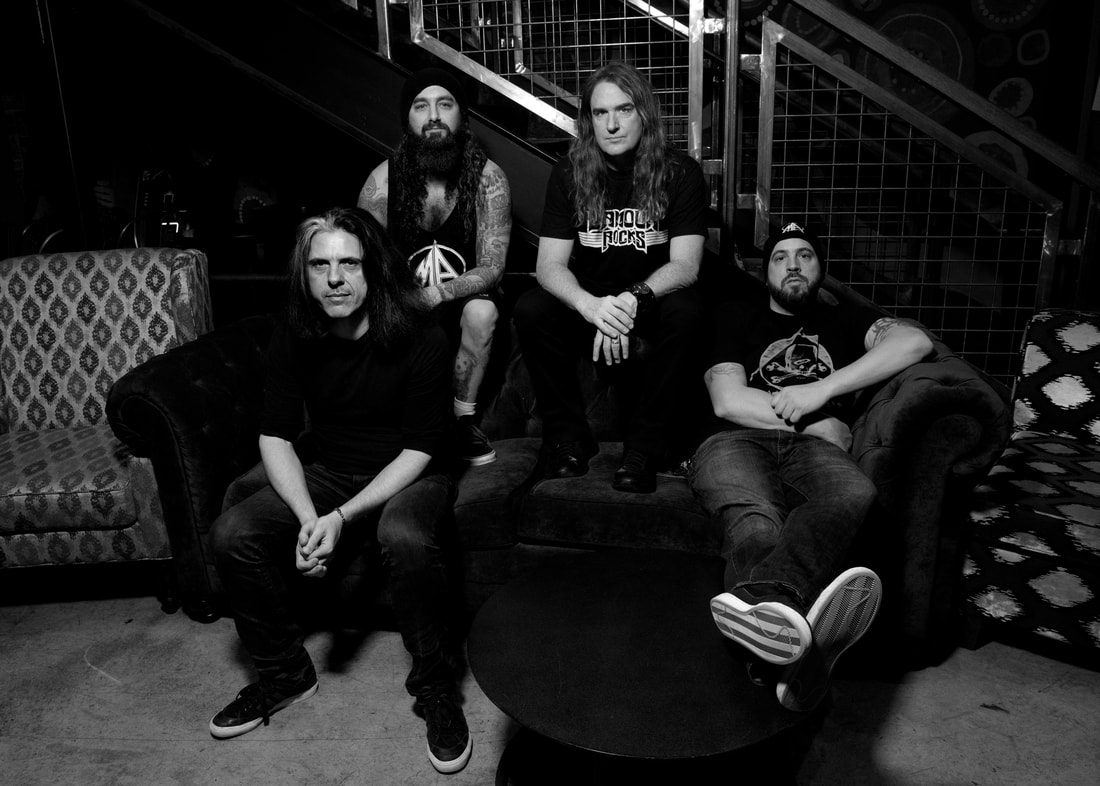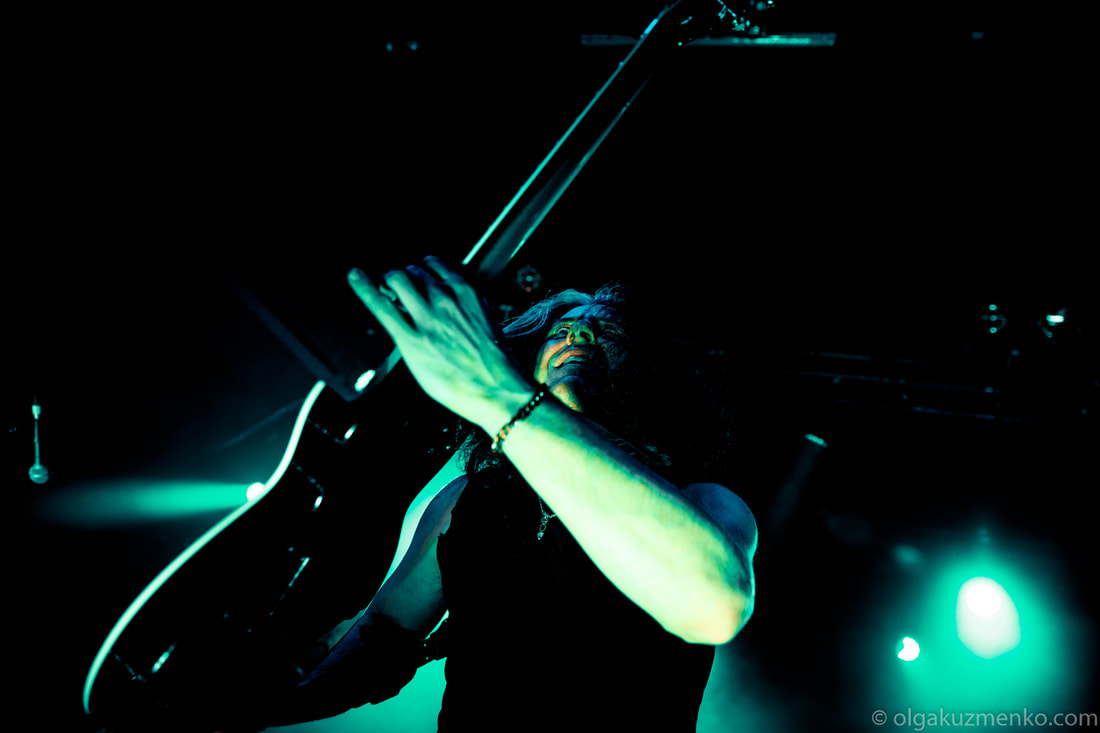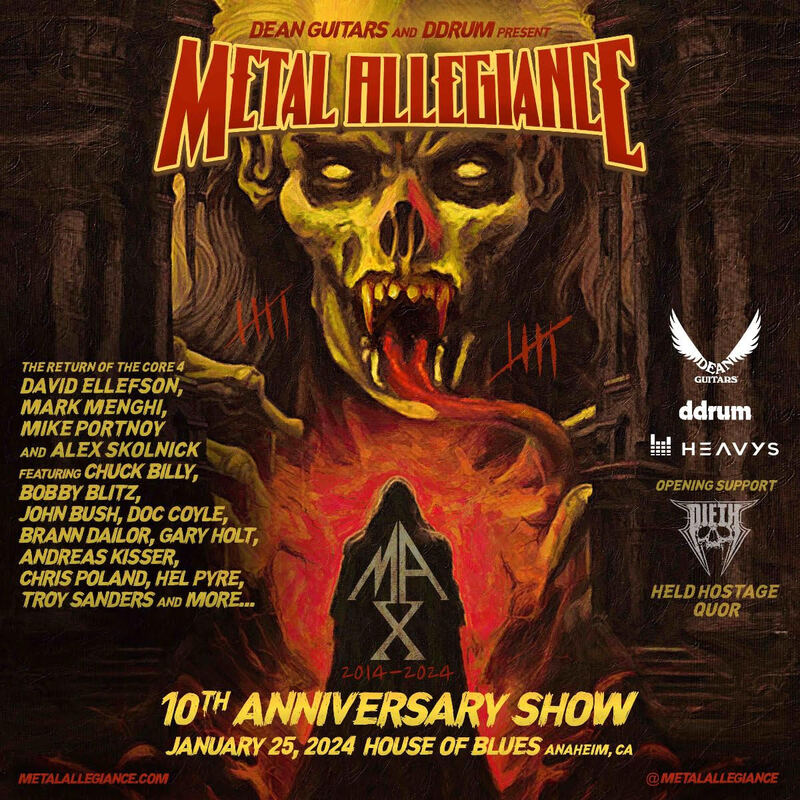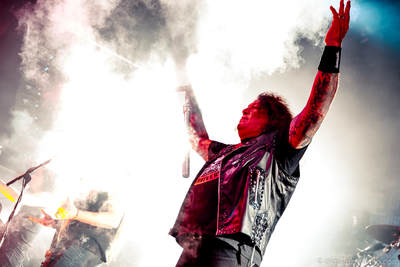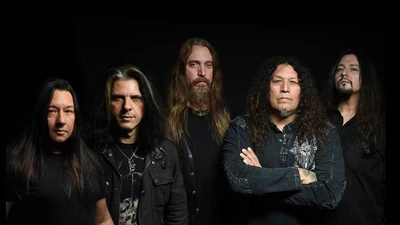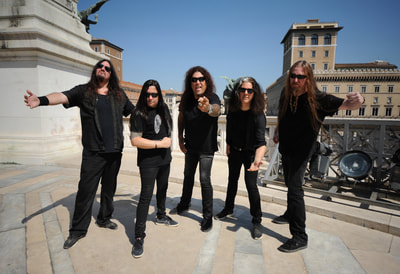|
One of the most respected guitar players of the mid-eighties, Alex Skolnick made his mark with thrash metal originators Testament. Part of a new breed of player whose technical ability added a whole new dimension to the nascent subgenre, he's since gone on to lead his own Alex Skolnick Trio, as well as appearing on a whole host of projects outside of the Testament mothership. Celebrating a decade with supergroup Metal Allegiance, the New York resident is preparing for an all star show at Anaheim's House of Blues in late January 2024. Talking Metal Allegiance, the evolution of the guitar hero, and his time in Ozzy Osbourne's band, we caught up with Alex Skolnick. In the Apocalyptic city; Eamon O'Neill.
Hi Alex, how are you today?
Okay, yeah. It's a busy day of press, it turns out! You're celebrating ten years of Metal Allegiance; how does that feel? Yeah, it's really hard to believe. I mean, it's gone by so quickly, and yeah, it's fun to be doing all this promotion. Usually we don't do this much promotion for a show, but it's good that we're doing it. It's been a while since we've played I mean, I think the last time we played was - well, we did have a show in Brazil. We did Rock in Rio, which was fantastic - but we haven't done one of these epic, all star events in the US, and especially during the week of the NAMM show, in four years. So it's like a four year reunion and an anniversary show. I'm guessing Metal Allegiance has always been; "let's get together and just have some fun", so is it like part of your job again to be doing press for it? No, it's good, because it always felt like it needed a little bit more attention. You know, it is tough because, yeah, most of us are part of other projects that are very high profile, and, yeah, some of us are really busy. I have a full time instrumental career outside of the band [Testament]. That same week, I'm going to be doing a tribute concert to Leslie West. I'm going to be playing with two my favourite instrumentalists; Stuart Hamm and Chad Wackerman, formerly of Frank Zappa and Allan Holdsworth, and then a few days later, I'm doing a tour with the great Percy Jones of Brand X doing, we have a new recording out. And then I have a few shows with the Testament and on the east coast. So yeah, there's a lot of juggling that goes on, and Metal Allegiance shows don't happen that often, but when they do, they're very exciting. We always manage to squeeze them in somehow. For Metal Allegiance, part of the fun must be in playing cover versions, and people coming in and out and paying homage to your heroes. Yeah, I mean, part of it is that you know the expectations aren't as high, which is great, especially to play covers; you're not going to be judged by the songs or the production. Yeah, somebody else wrote the songs, and you're not going to be judged any harsher than any bar band at a pub, but it's just as long as you have fun and the the audience has fun. Of course, in this case, there are original compositions, but you know, the spirit of the whole thing being a tribute show, that carries over even into the originals; they have the same sense of fun. I wanted to talk to you about the other guys that are coming in, and one of those is Chris Poland. He comes from a jazz fusion background as well.
Oh yeah, he's fantastic. I mean, we actually toured together once in the 2000s, with his group, my trio, which kind of falls more in the jazz guitar category, and Marty Friedman. I think we should try to do that tour again, because I think it would do even better. At the time, we were all sort of under the shadows of our associations, and now I think it would be a bigger deal. But I remember I hadn't heard Chris play in years and that he really developed that side of his playing and really had the fusion thing together. As much as I liked the Megadeth music on the first couple records, you know, I don't think those showcased his playing quite as much. I mean, obviously, the songs are great and he's got some cool moments, but hearing him in the 2000s, like, I really got what he was about. And once he got his own project together, it all made sense. In the mid '80s, Chris, Poland and yourself bought something different to those early thrash records with your playing styles; your solo on 'Souls of Black', for example, was something else. Yeah, well, I was just talking about that in another interview with a radio station. I don't know why that song had come up, but we were also talking about Leslie West, who I'll be paying tribute to, and Leslie West was one of these players that had a very pure sound; it's just a guitar and an overdriven amplifier, with not a lot of effects, not a lot of tremolo bar activity. Really the notes took more of a precedence over the showmanship, and I think when we did 'Souls of Black', I was trying to think about players like that. Gary Moore was another, you know, very different; it's very clearly a guitar, and there's no pedals or gimmicks that make it sound like something else. That can be very cool, too, but this is a guy that unquestionably made it sound like a guitar. So Gary Moore influenced the 'Souls of Black' solo? I wanted to do a solo more like that, because I was coming from a place where I liked technical guitar playing, but the good technical guitar players who were popular were my former teacher, Joe Satriani, and Steve Vai and others. And just the tremolo bar, it was just craziness, and everybody was trying to sound like them and doing dive bombs and all this stuff, and so I just avoided it. I had my guitar techs lock my tremolos! I did. I did a little bit of that on 'Practice What You Preach' [1989], but then I said; "okay, no more! It's just gotten out of control", and yeah, I just wanted to have raw, memorable solo, and I was thinking about players like Gary Moore and Leslie West. In the song's video you used this pink-coloured Ibanez; do you still have it? I do. Did you actually record the solo on that guitar in the studio? I should remember this. I should know the answer. I used one of two guitars. I think it was that one. To my knowledge, it was that one. There was also a white Ibanez I was using that had a similar model number. It was called the 540P. The red one, the pinkish-red, that was called the 540S, but when I got it, it was called the Sabre, and it was a brand new guitar at the time. Thinking back I'm pretty sure that that's what I used because I used that on most of those recordings. And I still have that one. I got rid of the 540P because I just was never playing it, but the 540S, the Sabre, I still have, and it's just so symbolic and such a part of that era. Joe Satriani, as you mentioned, was your guitar teacher, and on 'Souls of Black' I can't hear Joe in that at all. Had you purely developed into Alex Skolnick by then, as a player?
Oh yeah. Only on some of the very early stuff there was some Joe Satriani stuff you could point to, but it was also not the Joe Satriani stuff that most people know either, because before 'Surfing with the Alien', he had an album called 'Not of This Earth', and before that, he had this EP, that he's... it's kind of funny, he has very mixed feelings about it now, as he did the whole thing on guitar. He kind of created drum sounds on the guitar and like, making sounds with an Allen wrench, and detuning the string and playing bass by playing the bass lines. And yeah, it's weird. He's not that proud of it. I thought it was super creative at the time, and I remember some of the licks on that record. I was still very impressionable, and I was in high school, and I remember when I was working on the song that would become 'Alone in the Dark' off the First Testament record ['The Legacy', 1987], and there were some licks there, specifically in the intro that I could point to a couple of Satriani parts and say; "okay, there's a similarity there". That's incredible. After that, never again, partially because he had encouraged just finding your own voice listening to a lot of different players, but not being too influenced by one player, but also avoiding any players that it seemed everybody was listening to. And that was more the case back then, because before the modern age of the internet, and we're exposed to so many great players, nowadays, but back then, in the sort of mid to late '80s, the guitar players that got the most attention were featured in print magazines. Magazines like Guitar World, and Guitar for the Practising Musician. Yeah, and you could really name them on one hand, and it's weird, too, because I think as time went on, the impact of any one player sort of diminished in a way. It's not because of the players necessarily; it's just because people got used to the idea of virtuoso guitar playing, and there were more people playing. There were more players to keep track of, and then eventually we get to the internet. But at first it was almost like, you know, there was Jimi Hendrix, and who followed by Jimi Hendrix? Well, a lot of people would say, Jimmy Page, and probably more as a songwriter, producer, than maybe as, like how he executed the guitar. Some would say Richie Blackmore, as far as execution. I'd say that's a more logical choice, but I think it was one of the guitar magazines that basically said in, I think it's first like Van Halen cover story, like; "there was Hendrix; there was Page; this is next". As a guitar player, you were quite high profile by the early '90s, with a column in Guitar World etc. Well, I'll tell you, it was very unusual at the time because that that sort of heavy genre of metal, you know, at the time there was Motorhead, right, there was Slayer, and a lot of the players, they're fantastic, but it was more like coming from a raw punk rock band ethos. And yeah, I was a student of Satriani, but I was an avid listener of Van Halen, Yngwie [Malmsteen], even some of the L.A. guys who, you know, I didn't want to be in a band like that, but George Lynch, Warren DeMartini; I just thought those guys were fantastic. I just could never see like, wearing that kind of stuff, and so in a way I was very true to the Bay Area in that sense. But yeah, I was really coming from it from a musical standpoint, and I knew I wanted to play technically challenging guitar playing that would that would interest me, and at the time that music was not associated with that; it was really seen more through like the Motorhead, or kind of garage rock ethos, but then it changed. Yeah, metal became more technical. I guess I had something to do with it. I tried to bring the quality of like DeMartini or Lynch into that, and then once Marty Friedman joined Megadeth - and I think he was better featured than Chris Poland, and also production got better - then it became acceptable to have, and then you fast forward to today and you have bands like Black Dahlia Murder with Brandon Ellis, or even Alexi Laiho, may he rest in peace. He brought virtuosity to real intense, kind of black metal-influenced, death metal. So it became normal, it became acceptable, but at the time, I remember some people thought it was weird. Like; "why do you have this guy who sounds like he could play for Ratt or Dokken playing in the metal band?!" But I also wrote a lot of the riffs, so I was very true to the music. But back to like the big guys, the big players, right? So it just seemed over the course of the '70s you had like, Hendrix, Page, Van Halen, and Joe, who I had mentioned before, had told me to kind of steer away from sounding too much like the most popular players, and the popular players at that time were Stevie Ray Vaughn, who I love to listen to. I learned some of the licks, but I wasn't that type of player. I knew I wanted to play hard rock music, but Yngwie was one that I had to be careful not to sound too much like because I was just you know, he was just a knockout, and then really the next couple players to get that level of attention were Steve Vai who Joe had all this history with. I remember talking to him about Steve Vai during the lessons because to me, this guy came out of nowhere. I'm a huge Zappa fan, but I wasn't really that familiar with his Zappa work. And then Joe was like the next guy that everybody was trying to sound like. So in those later subsequent years, I tried to avoid sounding like them as much as possible. I think they were like the last guys too. I can't think of anybody else since then that really came out because it just became saturated. We're running short on time, and I have to ask you about the Ozzy gig in 1996; it almost happened, and you even played a gig in Nottingham with him, didn't you?
That's exactly right. Yeah, he was going through guitar players apparently like crazy. And yeah, and it was never spelled out. It was one of those things like; "what? I'm not sure what's going on. I know I'm invited to fly to London". The whole thing just had this big mystery to it. But I gradually figured out; "okay, there's an audition process happening". And I don't think they were flying a lot of players out, I think they were trying a lot of players out that were based in the U.K., but they flew out a few players who were known at the time, that had a reputation, and I guess because I was known from the magazines, and from the work with Testament. And yeah, it was just being in that world for by about a week, like the audition, like to stick around; "we're going to keep you around; there's going to be some rehearsals. Oh, we're going to do a show". How did you feel it went? It's kind of a long story. I've told it before, but it seemed like it went really well, and the crew and everybody said he looked really happy on stage. But I just always got a sense from Sharon [Osbourne] that, you know, she was really looking to replace Zakk Wylde. And, you know, she made suggestions about how low, how to hold the guitar and lowering the guitar, because Zakk, and Slash and other players, they play with the guitar down, and that's never been my thing. And just knowing what I know about the entertainment business now, I think, yeah, I think she was used to that. Yeah, when I think of Joe Holmes who got the gig, he held his Strat way low. Yeah, and that at the time, that's what she wanted. I don't know. I don't know if he cared. I think he just wanted the music to feel right, but I felt like that's what she wanted. And when he ended up being the guy, that made sense. But then he wasn't even around that long. I don't even know if he was on the next record. Yeah, he didn't play on an Ozzy record. He wasn't even on the next record? Well, so who knows? Maybe even if I had been hired, maybe it would have been the same situation. But it was a very strange time period. Still, I'm sure it's nice to be up there with Randy Rhodes and with Jake E Lee etc, if even only for a week. Oh absolutely, yeah, just really dive into that music. It was a very enlightening experience. And also, Geezer [Butler] was on bass, basically like, half of Black Sabbath you know, and that's like, what what a treat to get! Bringing things right back around, and the Metal Allegiance show is happening on the 25th January; will there be any Ozzy songs in the set? Not this time, no. I think we should. We definitely should. I think we will eventually. We've done a lot of Sabbath but we haven't done a lot of Ozzy solo material, but I think it's time. Without giving too much away, what can people expect from the shows; you've got two and a half albums, and you've got John Bush there, Chuck Billy, Bobby Blitz... All of them have recordings with the group, so you can count on those songs. And then Troy Sanders will be there from Mastodon, and he's sang on a song, so his song will be there as well. And yeah, there's going to be some great all star covers which I think are going to blow people's minds. Like this interview? Like us on FaceBook and follow us on Twitter for regular updates & more of the same. Metal Allegiance play Anaheim's House of Blues on 25th January 2024. For tickets, click here. |
|
Alex Skolnick
"George Lynch, Warren DeMartini; I thought those guys were fantastic. I just could never see like, wearing that kind of stuff."
© 2016 - 2024 eonmusic.co.ukContact: [email protected]
|

